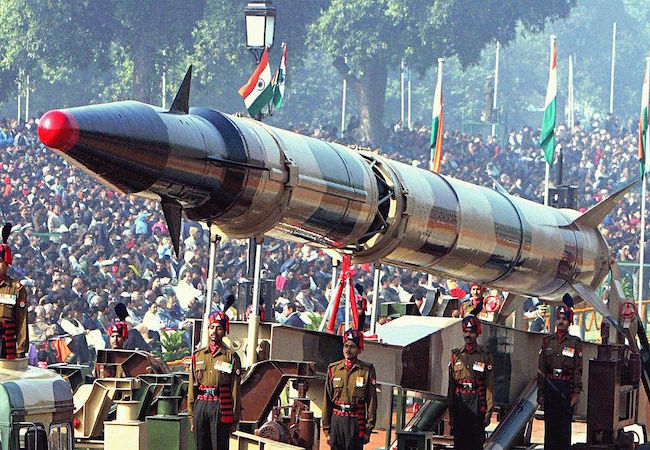Has the NSG lost its relevance?

By Hira Qadeer Khan
Since India has officially requested for NSG’s membership, it has become one of the burning issues in the South Asian region for countries like China, Pakistan and many others. It has also posed a serious challenge for the NSG members who are trying to increase the membership of the NSG since 1970s. It is important to keep in mind the main purpose of the creation of this particular nuclear cartel also known as the ‘London Club’. It was established as a voluntary cartel in response to India’s so called Peaceful Nuclear Explosion in 1975. Its main focus was to impede its members from assisting India in producing nuclear weapons. It is quiet surprising today, that India’s application is being considered and deliberations are yet to take place whether to include her in the cartel or not. Instead of supporting a complete and an effective implementation of the Non-proliferation treaty (NPT) has been using its 2008 waiver given by NSG for justifying its application.
Although the NSG’s guidelines are not binding upon the members but they should adhere to it if they are part of the NSG. Also in the process of incorporating new members in the nuclear cartel, NSG should be careful in accepting only those states which comply with the non-proliferation principle, on the basis of which NSG stands. This would help the group strengthen its image internationally vis a vis other regimes created for peaceful use of nuclear weapons. Any country that wants to become a member of this prestigious group will have to make sure it does not put its hands in such activities that lead to the proliferation of nuclear weapons for military purpose that might have a destructive outcome. It should be a member of the NPT and should also place their nuclear power reactors plus overall nuclear activities including exports under the safeguards of International Atomic Energy Agency (IAEA).
It is clear that India has a doubtful track record of its nuclear safety shown from 1974 and 1988 nuclear tests and mocking the whole non-proliferation regime until recently. India never signed the Non-Proliferation Treaty (NPT) because she felt it was discriminatory It vetoed the CTBT in 1996, such examples show that India has never been interested in contributing to the non-proliferation of regime. India wants to expand its nuclear industry. It wants to rise as a nuclear power in the region. There was no question of India to get accepted by the NSG as it has been under sanctions due to the violations India made with its donors. It was the US-nuclear deal that paved a way for India to get an exceptional treatment by convincing the NSG members to grant India a waiver in 2008. India actually enjoyed the benefits of NSG membership without having being allowed to enter in the NSG. It got an opportunity to develop its nuclear programme and it was observed that India also increased its fissile stockpile. Also it intended to have an access to nuclear material that could be used for military purposes. Once again the US is persuading NSG members to grant India membership. If India is granted NSG membership it will undermine the NPT because India has not sign it and it will further challenge the basic idea of the NSG. With expanding its membership the NSG also needs to maintain its efficiency. It will lose its relevance if it included India despite the fact that India will not be a sincere member of the group and that is it not ready to comply with the guidelines of the NSG. Therefore, the decision of entering India in the group will make NSG vulnerable and unable to fulfil its main objectives. It might get labelled as a discriminatory group.
Moreover it will give a chance to other nuclear countries to stand against this decision and make claims for their inclusion too. Such as Pakistan, Israel and North Korea who have not signed the NPT also deserves the NSG membership and equal treatment as India. Pakistan has already raised its voice at various international forums against the discrimination and the consequences in the region if India is given NSG membership. China and other countries like Ireland, Turkey and Brazil are supportive to Pakistan to veto the NSG membership to India. Pakistan has much stronger position as compare to India in safeguarding its nuclear assets as it has not misused the nuclear supplies given to it for peaceful purposes. China is emphasizing on making the consensus stronger among the members and that decision making based on consensus would be effective in the longer run. China was of the view that “NSG should have discussion on the joining of the non-NPT countries in a way agreed by all parties, so as to make a decision based on agreement. This position is not directed against any country and applies to all non-NPT states.”
Whatsoever the NSG should not grant any extra waiver or membership to any country including India that cannot stick to its guidelines. According to a US senator named Edward Markey, also was of the same opinion that “If India joined the Nuclear Suppliers Group, it would be the only participating government in the organisation that was not a party to NPT, weakening the NSG’s commitment to treaty. By refraining from admitting India, the NSG strengthened both the treaty and the broader global non-proliferation regime”. The NSG should not allow any country to misuse it for its national interest of rising as a hegemonic power in the South Asian region, which India is doing. If it kept on granting country specific exceptions, waivers or membership it would undermine the group’s credibility. A non-discriminatory criteria-based approach of NSG membership will help accommodate both nuclear and non-nuclear countries equally without losing its relevance.
Hira Qadeer Khan works for Strategic Vision Institute in Islamabad and can be reached at hirakhan4425@gmail.com.




